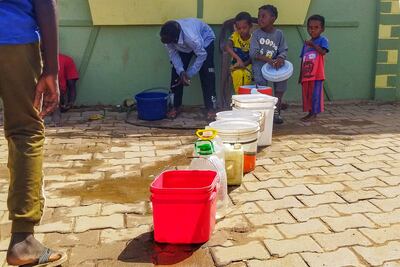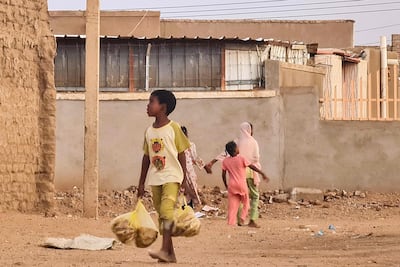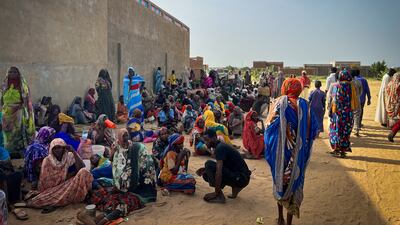A Sudanese army claim that its troops had come under attack by rebels in South Kordofan adds a new and troubling layer to the Sudan conflict, which is threatening to engulf the entire Afro-Arab nation, analysts have said.
Residents of the city of Kadugli in south-west Sudan, where the attack is supposed to have taken place on Wednesday, began fleeing the city on Thursday as tension escalated between the army and members of the Sudan People's Liberation Movement-North, witnesses said.
The army has since April 15 been locked in a bitter war with the paramilitary Rapid Support Forces, whose forerunner is the notorious Janjaweed militia.
The conflict has been centred in the capital Khartoum but has also spilt over into Darfur, where a genocidal civil war raged in the early 2000s. The root causes of the conflict remain in play to this day.

The current war has killed at least 3,000 civilians and injured twice as many, and has sparked a major humanitarian crisis.
At least 2.5 million people have been displaced by the war, including 500,000 who fled to neighbouring countries, mainly Egypt, Chad and South Sudan.
The violence in Khartoum and Darfur is part of a list of long-running conflicts, both dormant and active, in most of Sudan, including the regions of South Kordofan and the southern Blue Nile.
The violence also strengthens the potential for conflict in eastern Sudan, where inhabitants have long complained of discrimination by the Khartoum government and recently threatened to take up arms.
Sudan has been devastated by civil wars since the 1950s, mainly caused by the perceived political, economic and military monopoly enjoyed by the northern Sudanese establishment over the rest of the impoverished country.
In some cases, the cause of conflict is rooted in competition for land, water and pastures between rival ethnic groups. Some of these wars, such as the one that led the mainly animist and Christian south to secede in 2011, have lasted decades.

“The war in Khartoum has the potential to multiply into other wars and recent calls for civilians to arm themselves in Khartoum and in Darfur are only making that a real possibility,” said Sami Saeed, a Sudan expert based in Stockholm.
“Moreover, most of Sudan's neighbours can potentially be drawn into the conflict.”
In a statement on Wednesday night, the army said troops from an infantry division stationed in Kadugli came under a “treacherous” attack by rebels belonging to the SPLM-N, with whom the military has had a years-long ceasefire agreement.
“Our forces responded to the rebels and repelled the attacks and inflicted heavy losses. We also lost a number of martyrs and sustained injuries,” the army said.
South Kordofan is home to Sudan's main oilfields and borders West Darfur State as well as South Sudan.
The SPLM-N, which has strong ties to South Sudan, also attacked the army in the South Kordofan city of Al Dalanj on Wednesday, as did the RSF, Reuters reported on Thursday, quoting residents.
Residents of Kadugli said the army had redeployed forces to protect its positions in the city on Thursday, while the SPLM-N was gathering in areas on the outskirts, Reuters said.
It was not immediately clear what motivated the SPLM-N's Wednesday attack, but the timing appeared to be an attempt to take advantage of the security vacuum created by the war to consolidate or expand the group's territory.
South Kordofan has for many years been the epicentre of an anti-government rebellion demanding an end to what rebels see as discrimination by the nation's traditional elite in the Muslim and Arabised north.
“They have their long-standing demands and now they think wresting control of more territory gives them a better bargaining position when they sit and negotiate a deal with the military or the government,” said Sudanese analyst Osman Al Mirghani.
A flare-up in fighting between the army and the SPLM-N would signal a second and serious spillage of the war from the Sudanese capital. It could also be a prelude to fresh rebellions or the revival of old ones elsewhere in the vast nation of more than 40 million.
Last week, reports and images emerged of genocidal attacks by the RSF and allied Arab militias against members of an ethnically African tribe in the West Darfur city of Al Geneina, where activists say 1,100 people have been killed and tens of thousands forced to flee to Chad.
Activists and witnesses said men, women and children from the Masalit tribe making their way on foot to Chad were not spared, with many randomly gunned down by the RSF and militiamen. Bodies littered the streets of Al Geneina alongside torched homes and businesses, they said.

“It was an act of ethnic cleansing similar to what happened in Rwanda in 1994,” said Mr Al Mirghani, alluding to the massacre of an estimated 800,000 Rwandan Tutsis at the hands of the Hutu rival ethnic group.
Raising the potential for the Sudan conflict to expand and even draw in outside powers is the fragility of many of the nation's neighbours as well as the tribal and ethnic ties binding Sudanese with kinsmen across the border in places such as Chad, South Sudan and Ethiopia, according to Mr Saeed.
There is also the fact that some of Sudan's neighbours are torn by their own internal conflicts or are at odds with Sudan and could use the current war to forcibly settle long-running territorial disputes.
“This war in Sudan is very, very dangerous for the region,' said Mr Saeed. “Internally, the longer it goes on the bigger the possibility of new rival factions surfacing; and the weaker the central government becomes.”


